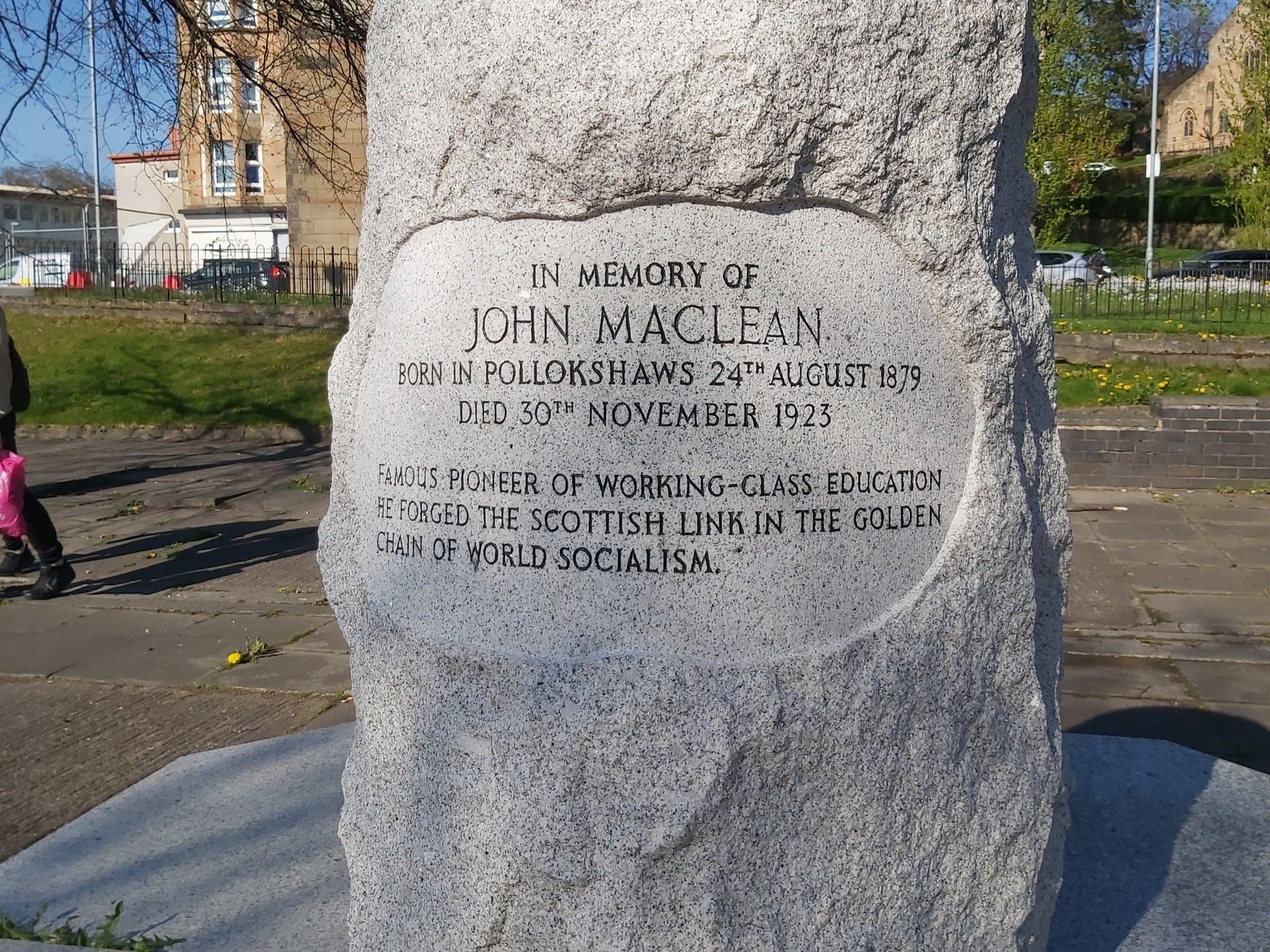In the footsteps of John Maclean: A History of Political Radicalism in the Southside
May Day is approaching and Glasgow’s trade union are hosting a whole variety of events for the May 1st celebrations. Before then, read about a history of political radicalism around Queen’s Park as Radical Glasgow Tours share the history of John Maclean.
By Radical Glasgow Tours’ Katherine Mackinnon, Henry Bell and David Lees
Maclean’s Cairn Macarthur Street
As you walk down Victoria Road and through Queen’s Park, do you ever think about who might have walked those same paths a hundred years ago? The city at the beginning of the 20th century was a hotbed of political radicalism and activism, and one of the Southsiders fighting for the rights of working-class people was Glasgow schoolteacher John Maclean. Follow in his footsteps, literally, and take your own radical walking tour though Govanhill and beyond.
Stop 1: St Bride’s Primary, Craigie Street
John Maclean was born in Pollokshaws into absolute poverty. Despite being raised in a two- room flat, seeing the deaths of three siblings and his father, and working throughout his childhood in factories and in service, Maclean’s mother and sisters ensured that he received an education and eventually qualified as a teacher. In the same years that he studied at Glasgow University, he encountered Marxism and read Marx’s Das Kapital for the first time.
Maclean with his class
Walk down this street on a school day and you will hear children shouting and singing, just as you would have done in Maclean’s time. Once qualified, Maclean’s first job was in this building, formerly Strathbungo School. Maclean was a young radical who found himself employed in a new and respectable suburb and he quickly made enemies with the headteacher. As well as filling his spare time campaigning for Britain’s first Marxist political party, The Social Democratic Federation, he formed the Scottish Association of Socialist Teacher and campaigned against homework and corporal punishment.
Stop 2: Langside Halls
Maclean spent the first decade of the 20th century securing a reputation as a powerful speaker. He lectured on Marx and socialism in every town in Scotland, from Shetland to the Borders. However Maclean’s regular political work came to an abrupt halt in 1914 when, supported by the Labour Party, the British Government declared war. The socialism of the second international came crashing down, as all the major socialist parties of Europe broke with each other and supported their nationalist governments instead. A small but significant group of Glaswegian socialists, who would become known as the Red Clydesiders rebelled against their parties and campaigned openly against the capitalist war, preaching to the public that the only winners in the war were the ruling class.
At the outbreak of war Maclean had been a nearly lone voice calling for strikes and sabotage to stop the slaughter. But by 1916 the scale of the massacre was clear to Glaswegians, as was the increasing legislation forbidding workers to leave their jobs and allowing wages to be handed directly to landlords if rent strikes occurred. The realities of the class struggle had never been plainer, and Maclean’s brand of Marxist agitation had never been more powerful.
Maclean’s speeches were immensely popular with the public and not at all popular with the authorities. Thousands gathered at street corners like this to hear him speak, and he was arrested four times making speeches on this spot outside Langside Halls. As a result the British government called him the most dangerous man in the country, Lenin suggested that it was Maclean who was most likely to lead a British revolution, and the Glasgow police arrested him countless times. He served sentences in Calton Jail, Barlinnie, Duke Street Prison, and Peterhead. Each time he was released, as public pressure grew so intense that the government in Westminster considered him more dangerous in jail than out.
Stop 3: 42 Auldhouse Rd
In early 1914, on a good teacher’s salary John Maclean bought this newbuilt house for £130. It would become the stable centre of his life, and one of the key sites in the development of West of Scotland Communism. From Auldhouse Road Maclean published countless pamphlets and newspapers, and it was to this house that a telegram from Leon Trotsky arrived, informing Maclean in 1918 that he had been made an honorary president of the Russian Soviet, the first workers state in the world. The telegram had first gone to the local liberal MP Duncan Maclean who forwarded it on to John with a note saying that he was flattered but assumed it was meant for him.
Maclean held adult education classes on Marxist economics in the nearby Sir John Maxwell School from 1907 onwards. A public petition for a night class in Das Kapital by Karl Marx led John Maclean to run the first state-funded classes in Marxism anywhere in the world.
Stop 4: John Maclean memorial cairn, 15 McArthur Street
Maclean’s funeral
Throughout his life Maclean’s commitment to education for liberation never faltered. He firmly believed that was all that was required. That a genuinely educated working class would rise up and build a better world, free from war and exploitation. But Maclean would never see such a world. As the pressures of his life and the constant state persecution began to take a toll, his physical and mental health deteriorated. His jail terms over the years included hard labour and force feeding, and his health never recovered from these ordeals. John Maclean died in 1923 and is commemorated here, at the head of the former road of tumbledown tenements and cottages where he was born in 1879.
“Out for Life and All That Life Can Give Us” John Maclean walking tour this weekend as part of the Glasgow Trades Union Council’s May Day celebrations is sold out - to find out about future tours email them here


